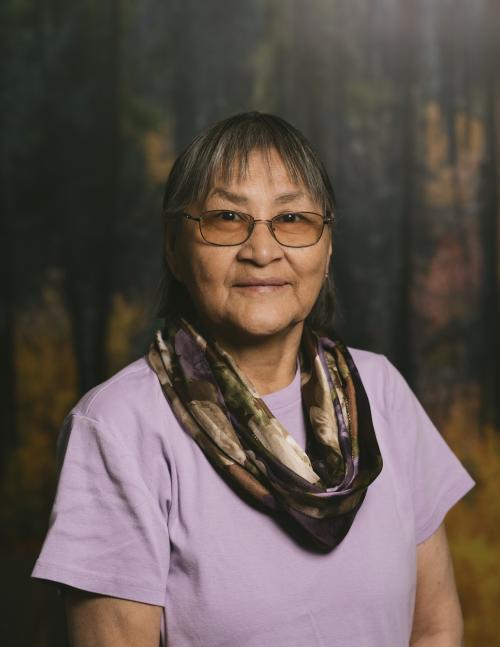Gine Dolphus, a resident of Délı̨nę, was born and raised in the community. Her grandparents were Mary and Joseph Tucho, and her parents were the late Jean and Cecilia Tucho. She has three children and some grandchildren.
In her free time, Gine engages in traditional activities such as making dry fish, preparing dry meat, and beading. Growing up, she spent time on the land, learning from her grandparents about hunting, fishing, and storytelling.
Gine's career spans various fields, including education and politics. In 1995, she pursued a year-long program in drug and alcohol studies, followed by a course in native clothing design in 1999 in Alberta. Her political journey began in 1983 and has been ongoing. Gine has been involved with the Native Women's Association both at the territorial and national level. She also served on a joint review panel for the federal government from 2000 to 2005. In Délı̨nę, she has served on council and was the president of the land corporation where she helped with work on self-government efforts.
Her path to the Sahtu Land and Water Board came through a nomination by the regional council. On the board, Gine works on various issues, including land use permits, water licenses, environmental assessments, and integrating traditional knowledge into decision-making processes.
“The work is important to me because we as Dene people, we look at the land and also we look at the water, we look at the plants and the animals of our community. We want them to be safe and for better for the future of our children,” she said.
Gine summarized her work on the board as including extensive reading, research, and participation in meetings and public hearings. She values the educational aspect of the role, noting that it provides opportunities for learning about and making decisions on important issues.
Gine believes it’s important for the public to be informed about the board's work, its mandate, and its role in the community and region.
“If anybody has any concerns or issues, bring it to my attention,” she said. “Or ask me about it, and then I'll bring it to the board. Sometimes we're not all there, but we can help and support each other by trying to do a better job for our land and for the situation we’re in regarding land or water.”
